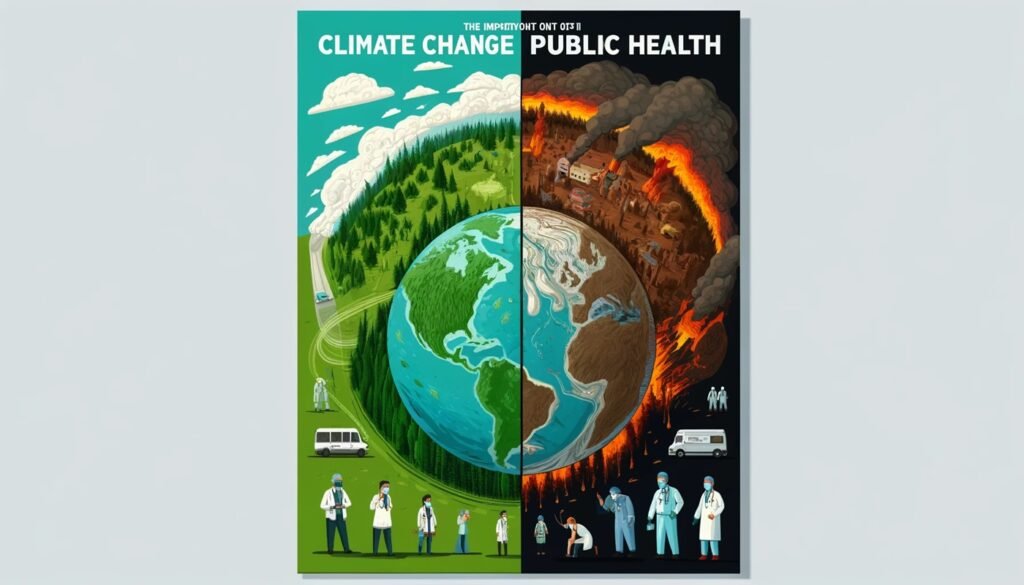
Climate change is a serious public health emergency, not only an environmental problem. Rising global temperatures are linked to an increased risk of developing new and worsening health issues. This blog examines the major ways that global public health is being impacted by climate change, including the spread of illnesses, effects on mental health, and strain on healthcare infrastructure.
Contents
The Direct Health Impacts of Climate Change
- Increased Heat-Related Illnesses
- Heatwaves have become more frequent and severe, leading to an increase in heat-related illnesses such as heat exhaustion and heatstroke. Vulnerable populations, including the elderly, children, and those with pre-existing health conditions, are particularly at risk.
- Respiratory and Cardiovascular Disease
- Air quality worsens as temperatures rise due to increased ground-level ozone and smog. This exacerbates respiratory conditions like asthma and can lead to a higher incidence of cardiovascular diseases.
- Vector-Borne Diseases
- Warmer temperatures and altered rainfall patterns are expanding the geographic range of vectors like mosquitoes and ticks, increasing the spread of diseases such as malaria, dengue fever, Lyme disease, and Zika virus.
Indirect Health Impacts Linked to Climate Change
- Food Security and Nutrition
- Climate change impacts crop yields and disrupts food production systems, leading to food insecurity. Nutritional content in food can also diminish due to elevated CO2 levels, impacting overall health.
- Water-Related Illnesses
- Changes in precipitation patterns and rising temperatures affect water quality and availability. Contaminated or scarce water supplies lead to hydration issues, poor sanitation, and diseases such as cholera and giardiasis.
- Mental Health
- The stress of living in areas affected by extreme weather events like hurricanes, floods, and wildfires can lead to mental health issues, including anxiety, depression, and post-traumatic stress disorder (PTSD).
Preventative Measures and Global Response
- Monitoring and Surveillance: Enhancing global and regional monitoring of climate-related health risks to better predict and respond to emerging threats.
- Infrastructure Resilience: Building healthcare infrastructure that can withstand extreme weather events and accommodate increased demands.
- Public Awareness and Education: Educating the public on the health risks posed by climate change and promoting protective behaviors and adaptation strategies.
- Policy and Advocacy: Developing policies that not only mitigate the effects of climate change but also address the root causes by reducing greenhouse gas emissions and transitioning to sustainable practices.
Conclusion
The multifaceted effects of climate change on public health necessitate a proactive, all-encompassing strategy to reduce risks and safeguard populations. Governments, communities, and individuals may all take effective steps to enhance public health resilience in the face of climate change by being aware of these effects.
FAQs about Climate Change and Public Health
Q: How can individuals help mitigate the health risks of climate change?
A: Individuals can reduce their carbon footprint, support sustainable and resilient community initiatives, and stay informed about health advisories and protective measures during extreme weather events.
Q: What are some adaptive strategies for communities to reduce climate change-related health risks?
A: Communities can implement heat action plans, improve water storage and sanitation facilities, enhance vector control programs, and ensure adequate healthcare services are available.
Q: Are some populations more vulnerable to the health effects of climate change than others?
A: Yes, populations such as children, the elderly, economically disadvantaged groups, and those with chronic diseases are more susceptible to the health effects of climate change due to their limited ability to adapt.
Q: How does climate change affect mental health?
A: Climate change can exacerbate stress and anxiety through direct effects like extreme weather events and indirect effects such as economic instability or displacement.